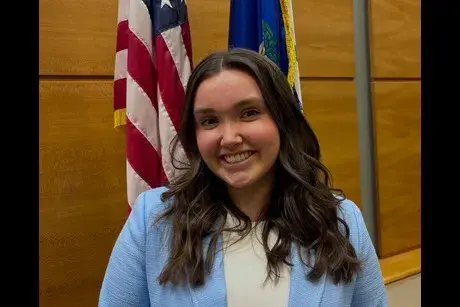Seeing Justice Up Close

No textbook warned Alexis Wozdusiewicz L’27 what it would feel like to walk into lockup for the first time.
She had studied criminal law in class. She had read the theories and debated the philosophy behind punishment and justice. But nothing prepared her for the moment she witnessed the criminal legal system at work.
“I had never spoken to someone accused of a crime before, or anyone incarcerated. It was shocking how quickly you become acclimated to it,” says Wozdusiewicz.
Through Roger Williams University School of Law’s Alternative Spring Break (ASB) program, Alexis joined the Connecticut Division of Public Defenders in Waterbury. There, she was paired with RWU Law alumni Kacey Stone ‘22 and Amanda Caron ‘24, who mentored her.
“I knew I wanted to work somewhere where I can advocate for people. I don't have issues speaking my mind, and I know I can use that to my advantage. The first day of my criminal law class at Roger Williams solidified this feeling.”
That spring break experience would become the foundation for something profound.
Respect, Compassion, and Trust
Later that summer, Alexis returned to the Public Defender’s Office in Waterbury for a full internship, where she had a new mentor team. That’s when she witnessed a case that would forever shift her perspective: the trial of Michael Anderson, a local restaurateur charged with murder in a 2022 fatal shooting. The defense? Self-defense.
“I learn a lot in my case books, but they don't teach me courtroom etiquette or court routines. I was able to experience that firsthand [during the Anderson case] and see how this process affects someone’s life.”
She was in the courtroom every day, hearing testimony, observing the defense strategy unfold, and watching Anderson testify in his own defense.
“I haven't been taught trial techniques or how you speak to the jury and expert witnesses. Watching that was fascinating.” Despite not yet having taken evidence or trial advocacy courses, Alexis absorbed everything. She watched how the attorneys interacted with their client with respect, compassion, and trust.
“It reinforced the significance of client relationships,” she says.
While the Anderson case provided insight into courtroom protocols, her most valuable learning came from debriefing each day with seasoned attorneys at the Public Defender’s Office. They shared stories from current cases and reflections on past experiences. Lessons that aren’t found in textbooks. These were the kinds of insights that only come from being in the field.
“Law school has taught me how to read a set of facts and how to apply the law. We don’t learn how to do this as real people, every day, all day long.”
And that was her biggest takeaway.
“Now I know what an average day looks like and how important it is to know that you can do this job. And do it well.”
As for what comes next? Wozdusiewicz is still figuring it out.
“Maybe juvenile criminal defense,” she says, thoughtful.
But one thing is certain: she’s not looking at the justice system through a casebook any longer.
